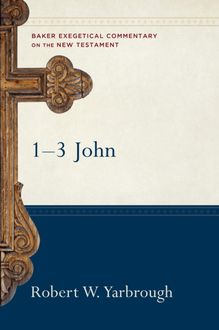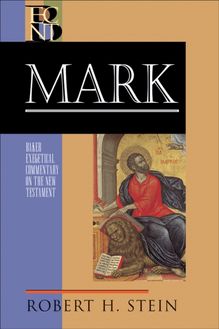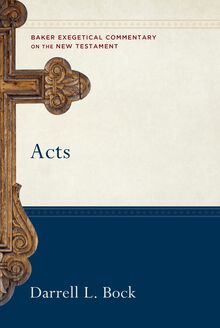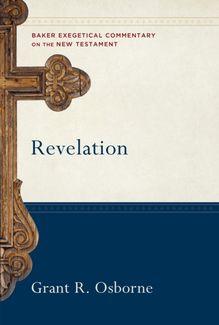-
 Univers
Univers
-
 Ebooks
Ebooks
-
 Livres audio
Livres audio
-
 Presse
Presse
-
 Podcasts
Podcasts
-
 BD
BD
-
 Documents
Documents
-
- Cours
- Révisions
- Ressources pédagogiques
- Sciences de l’éducation
- Manuels scolaires
- Langues
- Travaux de classe
- Annales de BEP
- Etudes supérieures
- Maternelle et primaire
- Fiches de lecture
- Orientation scolaire
- Méthodologie
- Corrigés de devoir
- Annales d’examens et concours
- Annales du bac
- Annales du brevet
- Rapports de stage
La lecture à portée de main
Vous pourrez modifier la taille du texte de cet ouvrage
Découvre YouScribe en t'inscrivant gratuitement
Je m'inscrisEphesians (Baker Exegetical Commentary on the New Testament) , livre ebook
Découvre YouScribe en t'inscrivant gratuitement
Je m'inscrisEn savoir plus
Vous pourrez modifier la taille du texte de cet ouvrage
En savoir plus

Description
Informations
| Publié par | Baker Publishing Group |
| Date de parution | 01 novembre 2010 |
| Nombre de lectures | 0 |
| EAN13 | 9781441235657 |
| Langue | English |
| Poids de l'ouvrage | 4 Mo |
Informations légales : prix de location à la page 0,1272€. Cette information est donnée uniquement à titre indicatif conformément à la législation en vigueur.
Extrait
Series Page
BAKER EXEGETICAL COMMENTARY ON THE NEW TESTAMENT
ROBERT W. YARBROUGH and JOSHUA W. JIPP, EDITORS
Volumes now available:
Matthew David L. Turner
Mark Robert H. Stein
Luke Darrell L. Bock
Acts Darrell L. Bock
Romans, 2nd ed. Thomas R. Schreiner
1 Corinthians David E. Garland
2 Corinthians George H. Guthrie
Galatians Douglas J. Moo
Ephesians Frank Thielman
Philippians Moisés Silva
Colossians and Philemon G. K. Beale
1–2 Thessalonians Jeffrey A. D. Weima
James Dan G. McCartney
1 Peter Karen H. Jobes
1–3 John Robert W. Yarbrough
Jude and 2 Peter Gene L. Green
Revelation Grant R. Osborne
***
Frank Thielman (PhD, Duke University) is Presbyterian Professor of Divinity at Beeson Divinity School of Samford University. He has written extensively on Paul’s view of the law and is the author of the NIV Application Commentary on Philippians and Theology of the New Testament: A Canonical and Synthetic Approach .
© 2010 by Frank Thielman
Published by Baker Academic a division of Baker Publishing Group P.O. Box 6287, Grand Rapids, MI 49516-6287 www.bakeracademic.com
Ebook edition created 2013
Ebook corrections 09.06.2017, 03.09.2022
All rights reserved. No part of this publication may be reproduced, stored in a retrieval system, or transmitted in any form or by any means—for example, electronic, photocopy, recording—without the prior written permission of the publisher. The only exception is brief quotations in printed reviews.
Library of Congress Cataloging-in-Publication Data is on file at the Library of Congress, Washington, DC.
ISBN 978-1-4412-3565-7
Scripture quotations are from The Holy Bible, English Standard Version, copyright © 2001, 2007 by Crossway Bibles, a division of Good News Publishers. Used by permission. All rights reserved.
Scripture quotations labeled NETS are from A New English Translation of the Septuagint , © 2007 by the International Organization for Septuagint and Cognate Studies, Inc. Used by permission of Oxford University Press. All rights reserved.
Scripture quotations labeled NRSV are from the New Revised Standard Version of the Bible, copyright © 1989, by the Division of Christian Education of the National Council of the Churches of Christ in the United States of America. Used by permission. All rights reserved.
Baker Publishing Group publications use paper produced from sustainable forestry practices and post-consumer waste whenever possible.
To Abby
Contents
Cover
Series Page
Title Page
Copyright Page
Dedication
Series Preface
Author’s Preface
Abbreviations
Transliteration
Map
Introduction to Ephesians
I. Prescript and Greeting (1:1–2)
II. Blessing God Who Has Blessed His People in Christ (1:3–14)
A. Praise to God for His Grace in Making Believers His People (1:3–6)
B. Praise to God for His Grace in Redemption and Revelation (1:7–10)
C. Praise to God for Making His People Heirs and Giving Them Hope in Christ (1:11–12)
D. Praise to God for the Conversion and Future Salvation of Paul’s Readers (1:13–14)
III. Thanksgiving for Conversion and Intercession for Understanding (1:15–23)
A. Thanksgiving for Faith and Love, and Intercession for Illumination (1:15–19)
B. God’s Great Power Displayed in Christ and for the Church (1:20–23)
IV. From Children of Wrath to New Creation (2:1–10)
A. Children of Wrath Like All the Rest (2:1–3)
B. Objects of God’s Mercy (2:4–7)
C. The Nature and Consequences of God’s Grace (2:8–10)
V. From Existence without God to Membership in the People of God (2:11–22)
A. The Special Plight of the Gentiles and God’s Response (2:11–13)
B. Christ Is the Believing Community’s Peace (2:14–18)
C. Gentile Christians as an Integral Part of God’s Household (2:19–22)
VI. Paul’s Divinely Given Task and His Suffering for the Gentiles (3:1–13)
A. Paul’s Role in the Administration of the Mystery (3:1–7)
B. How Paul Fulfills His Task (3:8–13)
VII. Paul Prays for His Readers’ Inner Strength and Praises the God Who Can Give It (3:14–21)
A. Paul Prays for His Readers’ Inner Strength (3:14–19)
B. Paul Praises the God Who Is Able to Strengthen His Readers (3:20–21)
VIII. The Growth of the Church toward Unity and Maturity (4:1–16)
A. Christian Unity and Its Theological Basis (4:1–6)
B. The Gifts of the Victorious Christ Cultivate the Body’s Maturity (4:7–16)
IX. A Reminder of How to Live as New Human Beings (4:17–5:2)
A. No Longer Walk as “Gentiles” but as a New Human Being (4:17–24)
B. Living as Human Beings Newly Created in God’s Image (4:25–5:2)
X. Avoiding and Transforming the Deeds of Darkness (5:3–14)
A. Avoiding Sexual Immorality and Greed (5:3–7)
B. From Avoidance to Transformation (5:8–14)
XI. Wise Conduct within the Household (5:15–6:9)
A. Introduction: Wisdom and the Life Filled in the Spirit (5:15–20)
B. Submission in the Believing Household (5:21–6:9)
XII. Standing against the Strategies of the Devil (6:10–20)
A. Wearing God’s Protective Armor (6:10–17)
B. Persevering in Watchful Prayer (6:18–20)
XIII. A Concluding Commendation and a Final Prayer-Wish (6:21–24)
A. Tychicus and His Mission (6:21–22)
B. Peace, Love, Faith, and Grace for the Letter’s Recipients (6:23–24)
Works Cited
Index of Subjects
Index of Authors
Index of Greek Words
Index of Scripture and Other Ancient Writings
Notes
Back Cover
Series Preface
The chief concern of the Baker Exegetical Commentary on the New Testament (BECNT) is to provide, within the framework of informed evangelical thought, commentaries that blend scholarly depth with readability, exegetical detail with sensitivity to the whole, and attention to critical problems with theological awareness. We hope thereby to attract the interest of a fairly wide audience, from the scholar who is looking for a thoughtful and independent examination of the text to the motivated lay Christian who craves a solid but accessible exposition.
Nevertheless, a major purpose is to address the needs of pastors and others involved in the preaching and exposition of the Scriptures as the uniquely inspired Word of God. This consideration affects directly the parameters of the series. For example, serious biblical expositors cannot afford to depend on a superficial treatment that avoids the difficult questions, but neither are they interested in encyclopedic commentaries that seek to cover every conceivable issue that may arise. Our aim, therefore, is to focus on those problems that have a direct bearing on the meaning of the text (although selected technical details are treated in the additional notes).
Similarly, a special effort is made to avoid treating exegetical questions for their own sake, that is, in relative isolation from the thrust of the argument as a whole. This effort may involve (at the discretion of the individual contributors) abandoning the verse-by-verse approach in favor of an exposition that focuses on the paragraph as the main unit of thought. In all cases, however, the commentaries will stress the development of the argument and explicitly relate each passage to what precedes and follows it so as to identify its function in context as clearly as possible.
We believe, moreover, that a responsible exegetical commentary must take fully into account the latest scholarly research, regardless of its source. The attempt to do this in the context of a conservative theological tradition presents certain challenges, and in the past the results have not always been commendable. In some cases, evangelicals appear to make use of critical scholarship not for the purpose of genuine interaction but only to dismiss it. In other cases, the interaction glides over into assimilation, theological distinctives are ignored or suppressed, and the end product cannot be differentiated from works that arise from a fundamentally different starting point.
The contributors to this series attempt to avoid these pitfalls. On the one hand, they do not consider traditional opinions to be sacrosanct, and they are certainly committed to doing justice to the biblical text whether or not it supports such opinions. On the other hand, they will not quickly abandon a long-standing view, if there is persuasive evidence in its favor, for the sake of fashionable theories. What is more important, the contributors share a belief in the trustworthiness and essential unity of Scripture. They also consider that the historic formulations of Christian doctrine, such as the ecumenical creeds and many of the documents originating in the sixteenth-century Reformation, arose from a legitimate reading of Scripture, thus providing a proper framework for its further interpretation. No doubt the use of such a starting point sometimes results in the imposition of a foreign construct on the text, but we deny that it must necessarily do so or that the writers who claim to approach the text without prejudices are invulnerable to the same danger.
Accordingly, we do not consider theological assumptions—from which, in any case, no commentator is free—to be obstacles to biblical interpretation. On the contrary, an exegete who hopes to understand the apostle Paul in a theological vacuum might just as easily try to interpret Aristotle without regard for the philosophical framework of his whole work or without having recourse to those subsequent philosophical categories that make possible a meaningful contextualization of his thought. It must be emphasized, however, that the contributors to the present series come from a variety of theological traditions and that they do not all have identical views with regard to the proper implementation of these general principles. In the end, all that matters is whether the series succeeds in representing the original text accurately, clearly, and meaningfully to the contemporary reader.
Shading has been used to assist the reader in locating salient sections of the treatment o
-
 Univers
Univers
-
 Ebooks
Ebooks
-
 Livres audio
Livres audio
-
 Presse
Presse
-
 Podcasts
Podcasts
-
 BD
BD
-
 Documents
Documents
-
Jeunesse
-
Littérature
-
Ressources professionnelles
-
Santé et bien-être
-
Savoirs
-
Education
-
Loisirs et hobbies
-
Art, musique et cinéma
-
Actualité et débat de société
-
Jeunesse
-
Littérature
-
Ressources professionnelles
-
Santé et bien-être
-
Savoirs
-
Education
-
Loisirs et hobbies
-
Art, musique et cinéma
-
Actualité et débat de société
-
Actualités
-
Lifestyle
-
Presse jeunesse
-
Presse professionnelle
-
Pratique
-
Presse sportive
-
Presse internationale
-
Culture & Médias
-
Action et Aventures
-
Science-fiction et Fantasy
-
Société
-
Jeunesse
-
Littérature
-
Ressources professionnelles
-
Santé et bien-être
-
Savoirs
-
Education
-
Loisirs et hobbies
-
Art, musique et cinéma
-
Actualité et débat de société
- Cours
- Révisions
- Ressources pédagogiques
- Sciences de l’éducation
- Manuels scolaires
- Langues
- Travaux de classe
- Annales de BEP
- Etudes supérieures
- Maternelle et primaire
- Fiches de lecture
- Orientation scolaire
- Méthodologie
- Corrigés de devoir
- Annales d’examens et concours
- Annales du bac
- Annales du brevet
- Rapports de stage




















